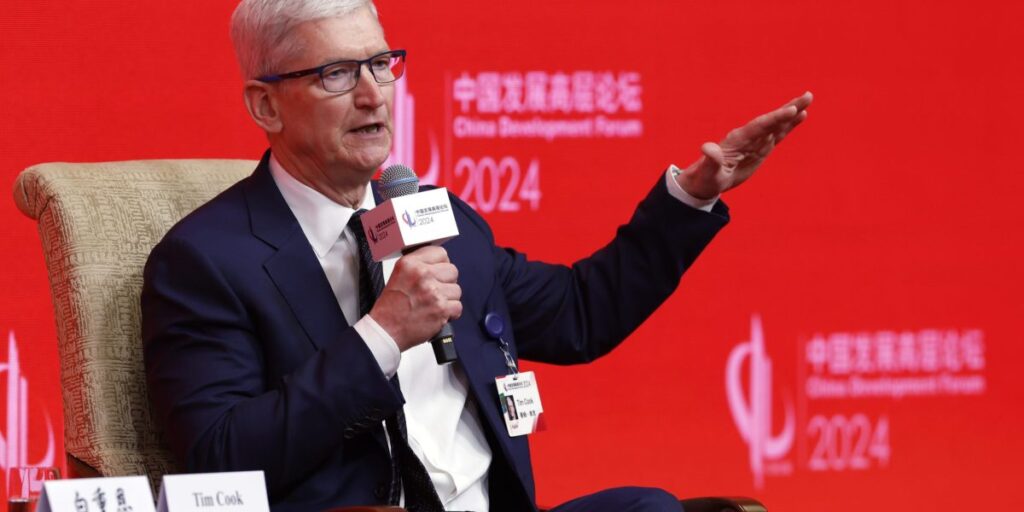Tim Cook flew to China for the first time in nearly eight months and made a surprise visit to one of Apple’s most important markets. The Apple CEO published a series of posts on his personal Weibo account showing meetings with university students and local artists.
China is a major market for Apple, accounting for 19% of its total sales last year. But the iPhone maker is struggling with increasing competition in the world’s largest smartphone market and regulatory challenges in getting hot new AI services into the hands of Chinese consumers.
Cook met with Chinese Minister of Industry and Information Technology Jin Zhuanglong on Wednesday. According to a statement shared on the ministry’s WeChat account, Chinese officials expressed hope that Apple will increase its presence in China.
Cook responded that Apple would expand its investments in China and help develop its supply chain there, according to a statement from the ministry.
Apple’s CEO last visited China in March as part of a high-profile summit in Beijing. During that visit, Cook opened the new Apple Store in Shanghai, the company’s second-largest retail store in the world.
Cook’s visit comes as Apple is about to release its new AI product, Apple Intelligence. The English-language service will be rolled out globally in just a few days, and could be rolled out in other languages such as Japanese and Chinese next year.
However, Apple has not yet announced a release date for Apple Intelligence in mainland China. The company acknowledged that the new service will not work on iPhones purchased in mainland China, nor will it work on iPhones used in China.
Will Wong, senior research manager at market research firm IDC, said: “The Apple CEO’s trip will primarily focus on AI, especially since Apple intelligence is a key selling point for new and potentially future iPhones. I can’t help but speculate that he might be right.”
Chinese users have complained about Apple’s slow release of AI in mainland China. iPhone makers face stiff domestic competition from brands such as Huawei, Honor, and Xiaomi. Apple is falling from its position as China’s best-selling brand compared to domestic manufacturers, according to an independent study.
Still, research firm Counterpoint Research announced earlier this month that while Apple’s new iPhones are selling 20% more in China than 2023 models, overall iPhone sales are down 2%. .
Apple is reportedly offering discounts on its official store on Chinese e-commerce platforms ahead of the big Singles’ Day shopping festival on November 11th. South China Morning Post.
China has strict rules regarding the use of AI, including requiring all models to comply with “socialist core values.”
Apple may need a local partner to launch AI services in China. All current models approved for use in China so far have been developed by companies based in mainland China.
According to wall street journal In June, Apple considered the possibility of using a large foreign language model in China, but determined that regulators were unlikely to approve it.
Apple has always complied with Chinese regulations. In 2017, Apple agreed to partner with local company Guizhou Cloud Big Data Industry Development to handle iCloud services for users in mainland China. Then, in 2018, Apple moved iCloud data for Chinese users to a new data center in Guizhou province. The company said the change was to comply with local cybersecurity laws.
Wong noted that Apple still plays an important role in China’s manufacturing industry, which could help the iPhone maker overcome hurdles in getting approval for its AI plans.
Cook could follow in the footsteps of Tesla CEO Elon Musk, who made a surprise visit to China himself in April. Shortly after this trip, the Chinese government tentatively approved the release of Tesla’s “Full Self-Driving” driving assistance service in the country. Tesla plans to launch the service next year. Like Apple, Tesla also has a large manufacturing base in China.
data sheet: Stay on top of the latest in the business of technology with thoughtful analysis of the industry’s biggest companies.
Sign up here.


